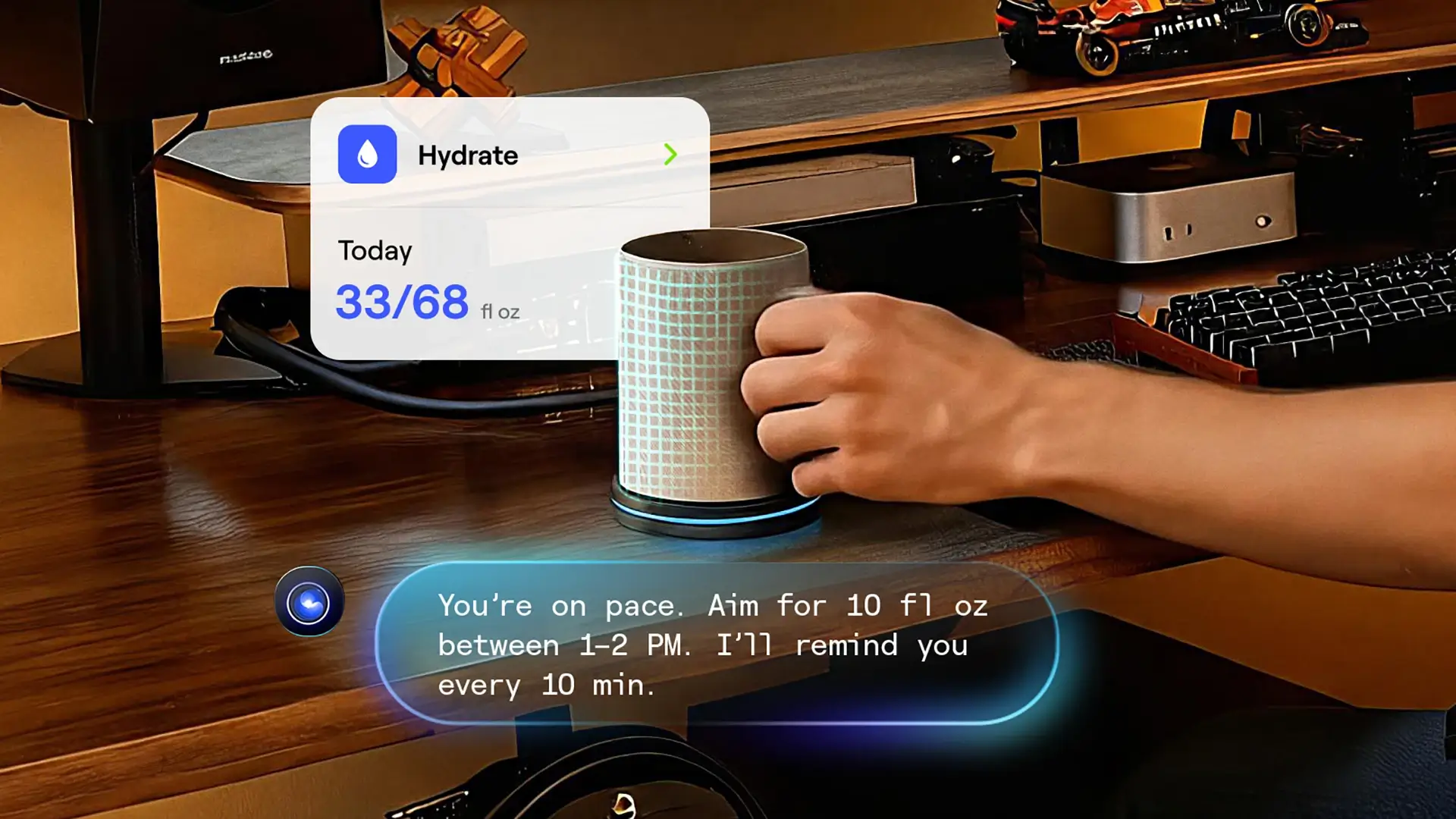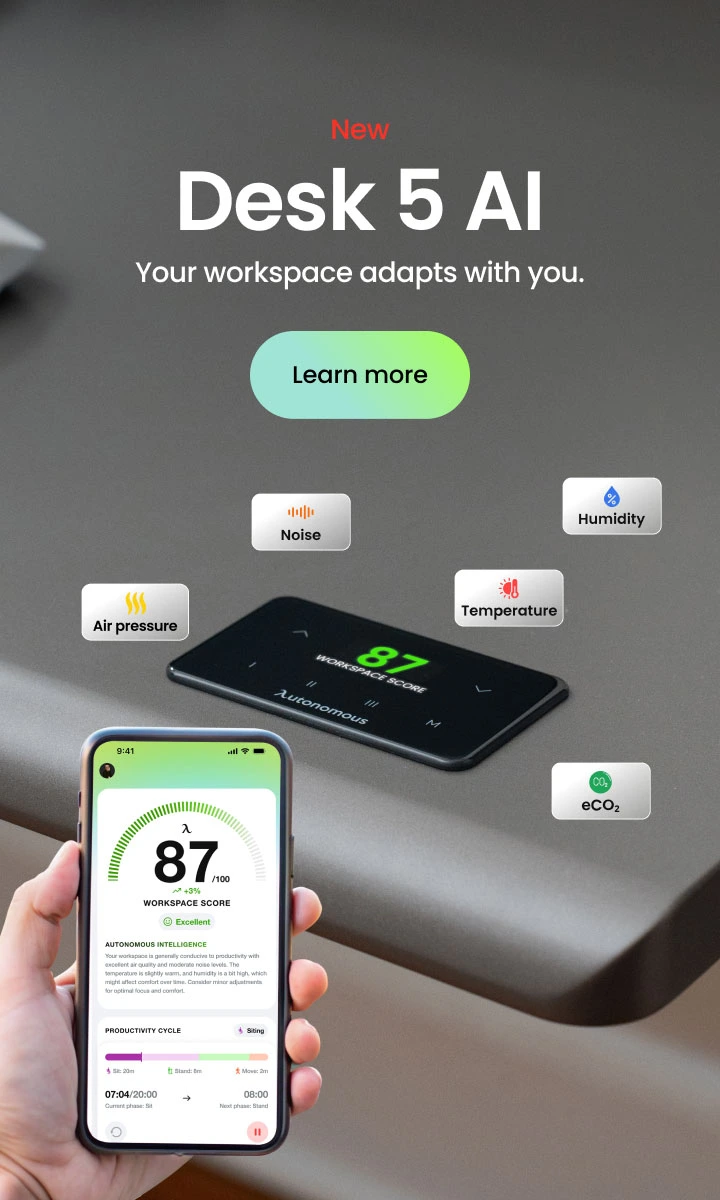
Drink Water For Headache Relief: What You Need To Know
Table of Contents
Headaches are something many of us deal with, and it’s natural to wonder if drinking water can help ease the pain. Dehydration is a common trigger, as it can cause the brain to shrink, leading to tension and discomfort.
So, does drinking water relieve headaches? The good news is, yes—hydration plays a key role in both preventing and reducing headaches. In this article, we’ll dive into how drinking water for a headache can provide relief and why staying hydrated is essential for your overall physical and mental well-being.
What Is A Dehydration Headache?
A dehydration headache is a common type of headache caused by insufficient hydration. When the body doesn't get enough water, it can trigger headaches, leading to discomfort and difficulty concentrating. These cognitive impacts can significantly affect your productivity, making it harder to complete tasks efficiently or think clearly throughout the day.
1. How Dehydration Causes Headaches
To understand whether you should drink water for a headache, it's helpful to know what happens inside your body when dehydration strikes:
- Brain Shrinkage and Pain Activation
Your brain is approximately 75% water, making hydration essential for optimal function. When you become dehydrated, your brain tissue temporarily loses fluid and contracts. This shrinkage pulls the brain away from the skull, activating pain-sensitive receptors and triggering headache pain.
This direct link between hydration and headaches explains why you may feel immediate pressure or throbbing when you're dehydrated.
- Compromised Blood Flow
Dehydration causes headache symptoms by reducing blood volume throughout your body. With less blood circulating, your brain receives insufficient oxygen and nutrients. This oxygen deprivation impairs brain function and intensifies pain signals, creating that familiar pounding sensation.
- Increased Sensitivity to Pain:
Research shows that dehydration actually lowers your pain threshold. When your hydration levels drop, your body becomes more sensitive to discomfort, making any headache feel more severe than it would if you were properly hydrated.

2. Recognizing Dehydration Headache Symptoms
Identifying a dehydration headache early can help you take quick action. Look for these telltale signs:
- Throbbing or Pounding Pain: The headache may be localized around the forehead, temples, or the back of the head. The pain often increases when standing or sitting up after lying down.
- Dry Mouth and Thirst: One of the primary signs of dehydration is a dry mouth, often accompanied by a constant feeling of thirst.
- Fatigue or Dizziness: Dehydration can cause a lack of energy and feelings of dizziness or lightheadedness, as the brain is not receiving enough oxygen and nutrients.
- Dark Urine: One of the most reliable indicators of dehydration is dark-colored urine. Healthy urine should be pale yellow, while dark urine suggests the body is holding onto water, and hydration levels are low.
Does water relieve headaches with these symptoms? Typically yes—if drinking fluids provides relief within 30 minutes to a few hours, dehydration was likely the cause.
3. Risk Factors For Dehydration Headaches
Certain situations and lifestyle factors increase your susceptibility to dehydration headaches:
- Not Drinking Enough Water:
The most obvious risk factor is simply not drinking enough water throughout the day. Busy schedules, lack of access to water, or consuming diuretics like coffee and alcohol without compensating with extra water all contribute to dehydration. If you frequently forget to drink water, headache episodes may become a recurring problem.
Office workers are particularly vulnerable, as they often get caught up in tasks and meetings without realizing hours have passed without hydration. Understanding hydration at work and implementing simple daily habits can significantly reduce headache frequency.
- Hot Weather and Physical Activity:
Hot weather, high altitude, and intense physical activity cause increased fluid loss through sweat. Athletes, outdoor workers, and anyone exercising without proper hydration are particularly vulnerable. The relationship between hydration and headaches becomes especially critical during summer months or strenuous activities.

- Illness:
Vomiting, diarrhea, or fever can lead to excessive fluid loss, making dehydration headaches more likely. When the body loses more fluids than it can replace,
dehydration becomes a serious risk.
- Dietary Factors:
A diet high in salt can exacerbate dehydration, as it requires more water to balance sodium levels in the body. Without adequate water intake, the risk of dehydration headaches increases.
The Role of Water in Relieving Headaches
Now that you understand what causes dehydration headaches and how to recognize them, let's explore why drinking water for a headache is so effective—and how to use hydration strategically for maximum relief.
- Immediate Fluid Replenishment
Within minutes of drinking water, your body begins absorbing fluids through the digestive system. This gradual rehydration reverses the brain tissue contraction that triggered your headache. As your brain tissue rehydrates, it regains its normal volume and the painful pulling away from the skull subsides. This is the primary mechanism behind how to get rid of a dehydration headache naturally.
- Restored Blood Volume and Circulation
Proper hydration increases your blood volume, allowing for improved circulation throughout your body. With enhanced blood flow, your brain receives adequate oxygen and essential nutrients, addressing the root cause of pain. This direct connection between hydration and headaches explains why symptoms often improve within 30 minutes to a few hours of rehydrating.
- Reduced Neural Stress
When dehydration causes headache symptoms, your brain operates under physiological stress. Rehydration alleviates this stress by normalizing cellular function and reducing the activation of pain-sensitive receptors. The result? Your headache intensity decreases as your hydration levels return to normal.

How Much Water Should You Drink To Prevent Or Relieve Headaches?
Staying properly hydrated is essential to prevent dehydration headaches. But how much water should you drink to avoid or relieve a headache caused by dehydration? While individual needs vary based on factors like age, activity level, and environment, there are general guidelines to follow that can help you maintain optimal hydration levels.
1. Daily Water Requirements
For overall health and headache prevention, adults should aim for:
- Women: Approximately 2.7 liters (91 ounces or about 11 cups) daily
- Men: Approximately 3.7 liters (125 ounces or about 15 cups) daily
These recommendations include water from all sources—beverages and water-rich foods. About 20% of your daily fluid intake typically comes from food, meaning you need roughly 8-12 cups of actual beverages.
If you're wondering how much water should I drink in a day based on your specific body weight, activity level, and health goals, individual calculations can provide a more personalized target.
For active dehydration headache relief, aim for:
When dehydration causes headache symptoms, you need targeted rehydration:
- Start with 16-32 ounces (2-4 cups) immediately
- Continue drinking 8 ounces every 20-30 minutes until symptoms improve
- Monitor your response—most people experience relief within 1-3 hours
Does water relieve headaches faster with this approach? Yes, because consistent intake maintains absorption rates and prevents overwhelming your system.

2. Signs You Need More Water
One of the easiest ways to assess whether you need more water is by checking your urine. Healthy urine should be light yellow, indicating sufficient hydration. If your urine is dark yellow or amber, it’s a clear sign that you need to drink more water to stay hydrated. Other signs that you may need more water include:
- Dry Mouth and Thirst: If you're feeling thirsty or your mouth feels dry, it’s a clear signal to hydrate.
- Fatigue or Dizziness: Dehydration can cause you to feel fatigued or lightheaded, which can worsen headache symptoms.
Pay attention to these cues, and drink more water to avoid dehydration headaches.
3. Beyond Plain Water: Holistic Hydration
While water is essential for headache prevention, proper hydration supports your entire body. Beyond stopping head pain, proper hydration offers numerous health benefits worth considering. Some discover they can drink water for weight loss as part of their wellness journey, while others find success when they drink water to clear skin issues they've struggled with for years. These interconnected benefits make consistent hydration a cornerstone of overall health:
Hydrating Foods
- Watermelon, cucumbers, oranges, and strawberries (90%+ water content)
- Soups and broths
- Yogurt and cottage cheese
Complementary Beverages
- Herbal teas (caffeine-free)
- Coconut water (natural electrolytes)
- Diluted fruit juices
What to Limit
- Caffeinated beverages (mild diuretic effect)
- Alcohol (significant dehydration risk)
- High-sugar drinks (can worsen dehydration)

Can Drinking Too Much Water Cause A Headache?
While most discussions about hydration and headaches focus on drinking too little water, there's a lesser-known phenomenon that deserves attention: overhydration. Yes, it's possible to drink too much water—and when you do, it can trigger the very headache you're trying to prevent. Understanding this paradox is crucial for anyone asking, "Does water relieve headaches in all situations?" The answer is nuanced.
The Water Overload Effect
While drinking water is necessary for health, can drinking too much water cause a headache? Yes, it can.
When you drink excessive amounts of water too quickly, your kidneys may struggle to excrete the excess, leading to a dilution of sodium in your body. This condition, known as hyponatremia, can cause swelling in the brain, which can result in headaches. This is why it's important to drink water consistently throughout the day without overloading your body in a short period.

Signs Your Headache Is From Overhydration
- Your urine is completely clear all day
- You're not thirsty but keep drinking
- The headache gets worse after drinking more water
- You're urinating more than once per hour
- Your stomach feels bloated
- You feel nauseous
Does water relieve headaches in both cases? No—that's the key difference. If drinking more water makes your headache worse, you may have had too much.
Finding the Right Balance
The key to hydration is consistency, not excess. While drinking water for a headache is effective for relief, it’s also important to listen to your body. Can drinking water cause headache? In rare cases, it can—if too much is consumed too quickly. To avoid overhydration, sip water steadily throughout the day instead of chugging large amounts at once.
By maintaining this healthy habit, you can maximize the benefits of hydration while avoiding the potential downsides of overhydration, keeping those dehydration headaches at bay without the risk of causing other issues.
Building Sustainable Hydration Habits For Long-Term Headache Prevention
Knowing how to get rid of a dehydration headache is valuable, but preventing them entirely is transformative. Here's how to make hydration automatic:
Morning Hydration Ritual
Start every day with hydration to offset overnight fluid loss:
- Place a 16-ounce glass of water on your nightstand before bed
- Drink it immediately upon waking, before coffee or breakfast
- Add a pinch of sea salt and lemon juice for enhanced absorption and mineral replenishment
- This single habit can reduce morning headache frequency significantly
Environmental Cues and Triggers
Make hydration unavoidable through strategic placement:
- Water bottle visibility: Keep filled bottles in every frequented space (desk, car, bag, nightstand)
- Glass size matters: Use 16-20 ounce glasses—finishing 4-6 throughout the day feels more achievable than counting sips
- Meal anchoring: Drink 8 ounces before each meal and snack (3 meals + 2 snacks = 40 ounces automatically)
- Movement reminders: Take a water break every time you stand up, change rooms, or check your phone

Technology-Assisted Hydration
If you struggle to remember when to drink water, modern apps and smart office accessories can provide the gentle reminders you need to build lasting habits.
- Hydration Tracking Apps:
Smartphone apps like WaterMinder, Plant Nanny, and MyWater transform hydration into measurable progress with visual tracking and customizable reminders. These apps calculate your ideal daily intake based on your weight, activity level, and schedule, then send notifications at optimal intervals throughout the day.
- Smart water bottles:
Tech-enabled bottles like HidrateSpark and Thermos Smart Lid offer physical reminders through glowing LED lights that activate when it's time to drink. These bottles track your intake automatically using built-in sensors, eliminating the need to manually log each glass.
For those looking for more advanced features, a water tracker for bottle that uses AI technology can adapt reminders based on your specific work schedule and activity patterns.
- Smartwatch integration:
Wearable devices like Apple Watch, Fitbit, and Garmin provide the most seamless tracking with gentle wrist taps that are harder to ignore than phone notifications. These devices allow quick logging with a single tap and display your hydration progress alongside other health metrics like steps and heart rate.
FAQs
1. What are the 5 warning signs of dehydration?
The five key signs of dehydration are: dry mouth, fatigue, dizziness, dark urine, and reduced urination. These signs indicate that your body needs water to maintain hydration levels and prevent dehydration-related complications like headaches.
2. Does drinking water relieve headaches?
Yes, drinking water can relieve headaches, particularly if they are caused by dehydration. Rehydrating helps restore normal brain function, reducing tension and alleviating the headache.
3. Why do I have a headache after drinking water?
A headache after drinking water may occur due to overhydration, where excess water dilutes electrolytes, causing a headache. It can also happen from rehydrating too quickly after dehydration or drinking very cold water.
4. Why does drinking water give me a headache?
Drinking water can give you a headache if you overhydrate or drink large amounts too quickly. This causes an imbalance in sodium levels (hyponatremia), leading to swelling in the brain and headaches.
5. How to get rid of a dehydration headache?
To get rid of a dehydration headache, drink water slowly and consistently to rehydrate. Rest in a cool environment and avoid caffeine or alcohol, which can further dehydrate the body.

Conclusion
In summary, staying hydrated is crucial for preventing dehydration headaches and promoting overall well-being. Drinking water regularly not only helps relieve headaches but also supports brain function and physical performance.
However, balance is key—drinking too much water can lead to overhydration headaches, so be mindful of your hydration levels. By monitoring your water intake and maintaining consistent hydration habits, you can effectively prevent and relieve headaches caused by dehydration.
Remember, your body’s hydration needs can vary based on factors like activity level, weather, and health conditions, so listen to your body and adjust accordingly. Stay hydrated, and keep headaches at bay!
Spread the word
.svg)

.webp)







